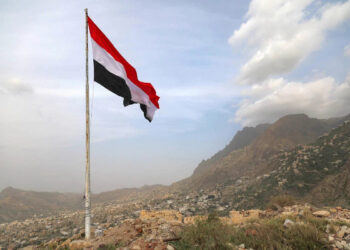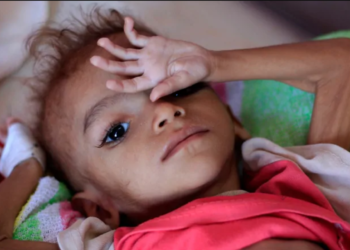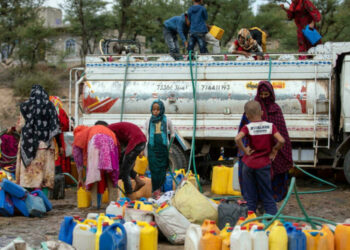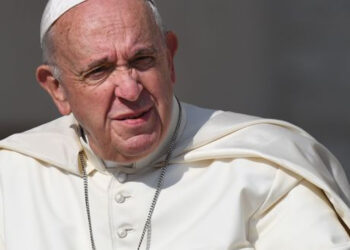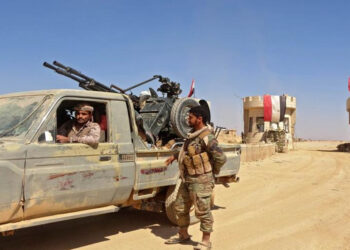Pope Francis, the first leader of the world’s 1.3 billion Catholics to visit the Arabian Peninsula, will attend an interfaith meeting in the United Arab Emirates on Monday as part of his outreach to Muslims.
The pontiff arrived in a modest black Kia at Abu Dhabi’s presidential palace, where he was welcomed with a lavish military parade.
Officers fired 21 shots in the air, while jets flew overhead leaving white and yellow trails – the colors of the Vatican City flag.
The pope’s highly publicized 48-hour visit to the United Arab Emirates will also include an open-air mass on Tuesday for 135,000 of the Muslim country’s million Catholic residents, set to be the largest public gathering in the country’s history.
Why This Matters
The pope was expected to raise the issue of Yemen, devastated by a war in which the UAE is a key player, in talks with Abu Dhabi’s Crown Prince Mohammed bin Zayed.
Yemen is the scene of what the U.N. calls the world’s worst humanitarian crisis, triggered by the intervention of Saudi Arabia, the UAE and their allies -including the United States – in a war between the government and Huthi rebels.
VIDEO: Pope Francis arrives in Abu Dhabi on the first ever papal visit to the Arabian Peninsula, where he will take part in an inter-religious conference pic.twitter.com/jVaHuhLqeu
— AFP news agency (@AFP) February 4, 2019
More than 10 million Yemenis now risk imminent starvation.
The UAE has dubbed 2019 its “year of tolerance”, but rights groups have criticized the country for its role in Yemen, where an estimated 10,000 people have been killed since the Saudi-led alliance joined the government’s fight against the Huthis in 2015.
Rights groups, which have slammed the UAE over its intolerance of dissent, have also urged the pope to raise the issue of Ahmed Mansoor, an Emirati activist serving a 10-year prison term.
Before heading to the Gulf on Sunday, Pope Francis urged warring parties in Yemen to respect a truce agreement and allow deliveries of food aid.
“The population is exhausted by the lengthy conflict and a great many children are suffering from hunger, but cannot access food depots,” he said.
“The cry of these children and their parents rises up to God.”
History Made
Sheikh Mohammed said on Monday that UAE rulers were “delighted” to meet the pontiff “in our homeland of tolerance.”
“We discussed enhancing cooperation, consolidating dialogue, tolerance, human coexistence, and important initiatives to achieve peace, stability and development for peoples and societies,” he tweeted.
Pope Francis, who made history when he touched down in Abu Dhabi on Sunday night, said he came “as a brother, in order to write a page of dialogue together and to travel paths of peace together.”
To mark the occasion, the pontiff offered the crown prince a framed medallion of the meeting between St. Francis Assisi – the pope’s namesake – and the Sultan of Egypt Malek al-Kamel, in 1219.
Sheikh Mohammed, in turn, offered a deed for the plot of land on which the first church in the UAE was built.
The pope was set to meet with Sheikh Ahmed al-Tayeb – imam of Cairo’s Al-Azhar, Sunni Islam’s prestigious seat of learning – later Monday.
Sheikh Ahmed greeted the pope personally with an embrace on Sunday night as the pontiff arrived in the UAE capital Abu Dhabi.
The emirate’s crown prince was also at the airport to greet the pontiff, who has made strengthening ties between Christianity and Islam a cornerstone of his papacy.
Hours before he flies back to Rome on Tuesday, the pope will lead a mass at a stadium in the capital.
The UAE, which prides itself on its religious diversity in the Gulf, is a member of the U.S.-led coalition battling the Islamic State group in both Syria and Iraq.
The UAE has eight Catholic churches. Oman, Kuwait, and Yemen each have four.
Qatar and Bahrain have one each, while ultra-conservative Sunni powerhouse Saudi Arabia bans all non-Muslim places of worship.
Muslims make up nearly four-fifths of the UAE’s population, but the country is also home to nearly a million Catholics, according to the Apostolic Vicariate of Southern Arabia.
Migrants from Asian countries make up about 65 percent of the population.
More on the Subject
A United Arab Emirates court sentenced British student Matthew Hedges to life in jail on spying charges in November, prompting a “shocked” Britain to warn of repercussions for relations with its longstanding Gulf ally.
Hedges, a 31-year-old PhD student, had protested his innocence ever since his arrest at Dubai airport on May 5 and British ministers had raised his case at the highest level.
“We can confirm that he was sentenced to life in prison,” a family spokesperson told AFP. “The hearing lasted less than five minutes, and his lawyer was not present.”



